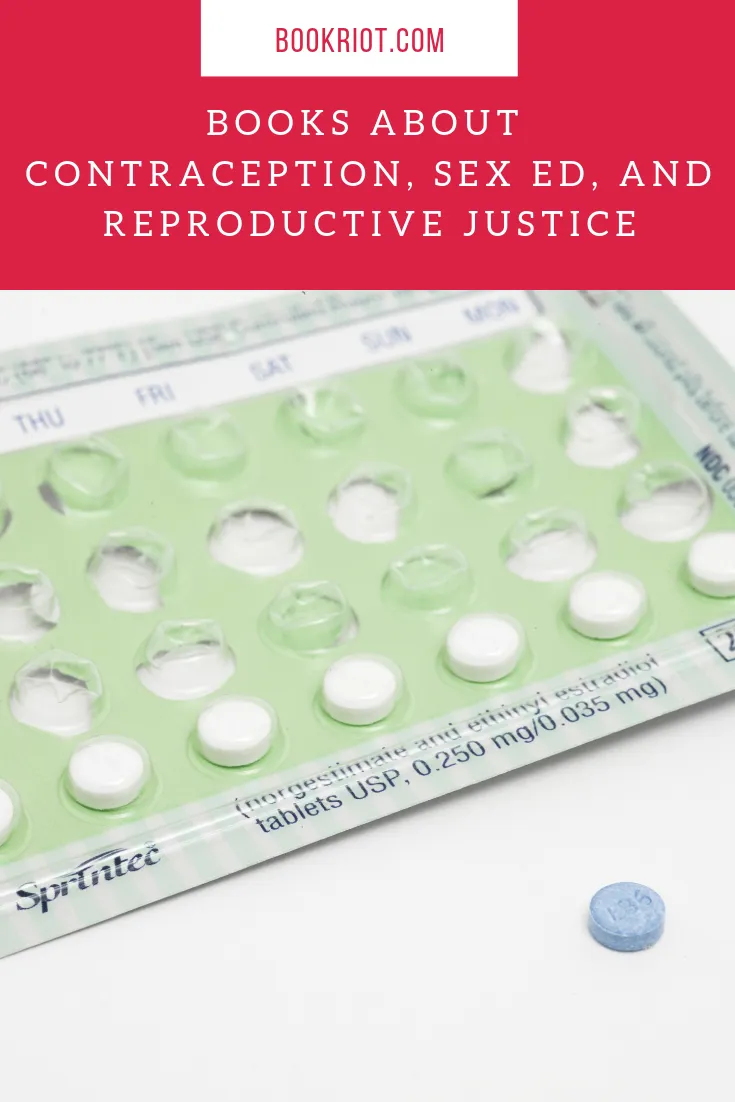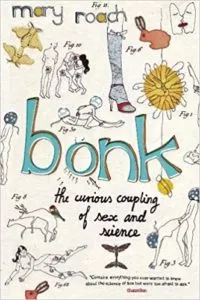
DTF: Books about Contraception, Sex Ed, and Reproductive Justice
This content contains affiliate links. When you buy through these links, we may earn an affiliate commission.
I’m not here to deliver sex education, but a story about the National Health Service in the UK recently caused a kerfuffle on social media, so I think this needs addressing. The NHS recently changed its guidance and now advises that women take the contraceptive pill continually, diverging from decades of insistence that a week-long break be adhered to, in order to facilitate the continuation of periods on a 28 day cycle. This original guidance essentially came out through efforts to have the Pope approve of contraceptive use for married couples.
 When I was in secondary school in (very Catholic 1990s) Ireland, a biology teacher told my class one day that this advise was bullshit, and that scientifically there was no reason not to take the pill continuously. She told us, full of raging feminism, that this was a prime example of women cowed into accepting a rule that took away true choice and rendered consent uninformed and meaningless.
Her impassioned speech stuck with me for many years, and so I wasn’t surprised by the recent announcement from the NHS. My friends, however, were. They told me that they had never, ever heard this before – and they were shocked by the weight of what they had accepted in ignorance and without question.
So here are a few books that may be of use to determine where we’re at with reproductive rights, through history and science to the present day. I’m not here to tell you right from wrong, but I’d like to contribute something to ensuring that at least everyone knows fact from dogma.
When I was in secondary school in (very Catholic 1990s) Ireland, a biology teacher told my class one day that this advise was bullshit, and that scientifically there was no reason not to take the pill continuously. She told us, full of raging feminism, that this was a prime example of women cowed into accepting a rule that took away true choice and rendered consent uninformed and meaningless.
Her impassioned speech stuck with me for many years, and so I wasn’t surprised by the recent announcement from the NHS. My friends, however, were. They told me that they had never, ever heard this before – and they were shocked by the weight of what they had accepted in ignorance and without question.
So here are a few books that may be of use to determine where we’re at with reproductive rights, through history and science to the present day. I’m not here to tell you right from wrong, but I’d like to contribute something to ensuring that at least everyone knows fact from dogma.
In the vein of passing on information in a fun and accessible way, Mary Roach has asked the questions many of us would shirk from – about orgasms, Viagra, sex toys and, interestingly, pig farms. Roach makes her topics entertaining and spends the book informing readers about things that we’ve never really had to think about before. To me, critical thinking is key to establishing a relationship with any medicine, especially when there are intimate impacts on a life.
At this point it’s fair for me to point out that just about all contributions by women of colour to reproductive rights have been erased with ease. The organization, collective effort, and contributions of these women need to have more eyes and ears, which is what this book is all about. Though not especially about contraception, the book certainly leads to a better understanding of why it matters. Black women, Native and Indigenous women, Latino, Asian, and Pacific Islander women all contributed to choice politics in their own way, much of which was pushed aside in favour of a dominant white viewpoint on what choice truly means. This is a key book if feminism is to move forward into proper inclusivity and reflects a struggle that’s been lost for too long.
 When I was in secondary school in (very Catholic 1990s) Ireland, a biology teacher told my class one day that this advise was bullshit, and that scientifically there was no reason not to take the pill continuously. She told us, full of raging feminism, that this was a prime example of women cowed into accepting a rule that took away true choice and rendered consent uninformed and meaningless.
Her impassioned speech stuck with me for many years, and so I wasn’t surprised by the recent announcement from the NHS. My friends, however, were. They told me that they had never, ever heard this before – and they were shocked by the weight of what they had accepted in ignorance and without question.
So here are a few books that may be of use to determine where we’re at with reproductive rights, through history and science to the present day. I’m not here to tell you right from wrong, but I’d like to contribute something to ensuring that at least everyone knows fact from dogma.
When I was in secondary school in (very Catholic 1990s) Ireland, a biology teacher told my class one day that this advise was bullshit, and that scientifically there was no reason not to take the pill continuously. She told us, full of raging feminism, that this was a prime example of women cowed into accepting a rule that took away true choice and rendered consent uninformed and meaningless.
Her impassioned speech stuck with me for many years, and so I wasn’t surprised by the recent announcement from the NHS. My friends, however, were. They told me that they had never, ever heard this before – and they were shocked by the weight of what they had accepted in ignorance and without question.
So here are a few books that may be of use to determine where we’re at with reproductive rights, through history and science to the present day. I’m not here to tell you right from wrong, but I’d like to contribute something to ensuring that at least everyone knows fact from dogma.



 Bonk: The Curious Coupling of Sex and Science
Bonk: The Curious Coupling of Sex and Science Undivided Rights
Undivided Rights

